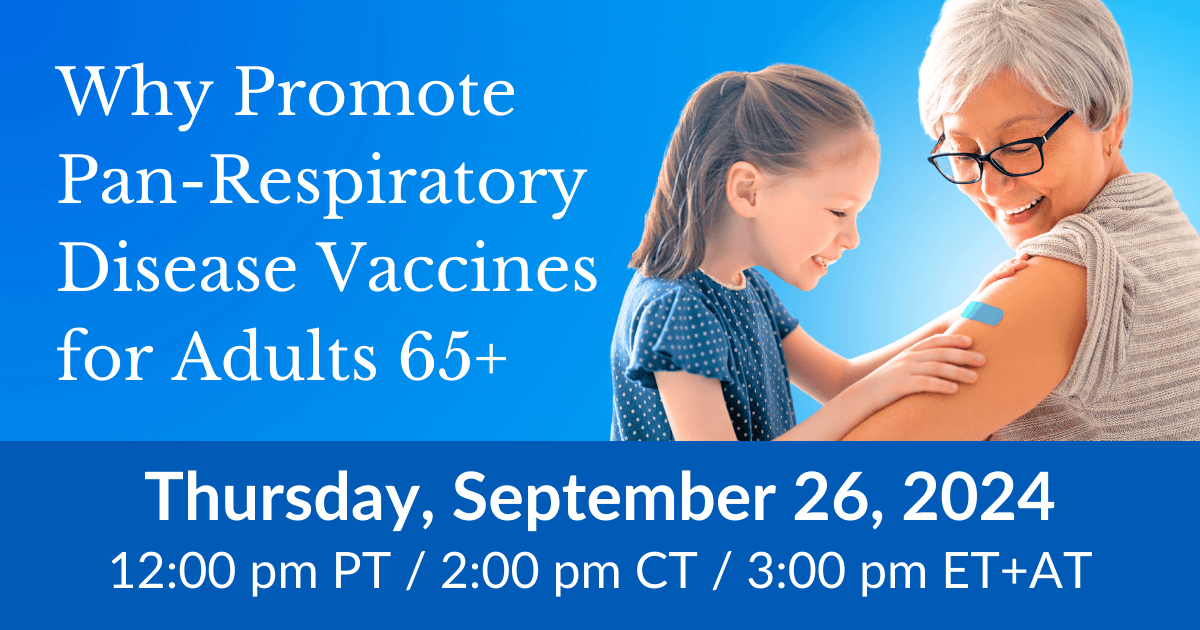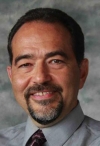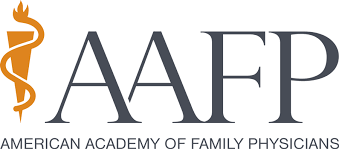

* This webinar will be provided in English with simultaneous interpretation into Spanish *
Vaccine science is evolving rapidly, and clinicians must maintain familiarity with the most recent guidelines. The recommended adult immunization schedule is updated annually by the Advisory Committee on Immunization Practices of the Centers for Disease Control and Prevention.
In this webinar, we will address the current vaccine guidelines for older individuals around the latest SARS-CoV-2 vaccines. We will also address recommendations around the RSV vaccine for those 60 and older, particularly for those with an underlying condition such as heart or lung disease, diabetes, and obesity. High risk individuals, such as smokers and the elderly on supplemental oxygen are at increased risk of infection adding to the importance vaccine adherence. This webinar will also discuss the latest efforts of the Risk Less Do More Campaign from the Department of Health and Human Services and how this public education campaign is being used to help reduce the effects that respiratory viruses have among individuals in the United States.
Watch the Webinar Recording
Download the Presentation Slides
Take the Evaluation
At the conclusion of this presentation, participants will be able to…
- Increase knowledge about why adults 65+ are at increased risk for severe respiratory disease, hospitalization and death.
- Increase familiarity with key vaccines that support elder respiratory health.
- Improve understanding of how chronic illness can increase risk for severe outcomes.
- Learn about the new pan-respiratory public education campaign, Risk Less. Do More. From the U.S. Department of Health and Human Services
Presenters

Laszlo
Madaras
MD, MPH, FAAFP, SFHM
Chief Medical Officer
Migrant Clinicians Network
As the Chief Medical Officer for Migrant Clinicians Network, Laszlo Madaras, MD, MPH is responsible for the oversight of MCN clinical activities. He also serves as a subject matter expert for various health topics including emerging issues, farmworker health, and Tuberculosis. Over the last 30 years, in parts of Africa, Central America, South America, the Pacific Islands, and the United States, Dr. Madaras has served thousands for wide-ranging ailments, including newly emerging diseases.
Dr. Madaras arrived to in the United States as a Hungarian refugee in 1968 at the age of seven and eventually became a US citizen. Dr. Madaras received his MD and MPH from Tufts University School of Medicine in 1993. Early experiences include working as an Albert Schweitzer Fellow in pediatrics in Gabon, West Africa; as a Peace Corps volunteer in the Congo; and as a pesticide review manager at the US Environmental Protection Agency. He worked on the Congo/Rwandan border during the 1994 Rwandan genocide, and on the Hungarian border with the former Yugoslavia in 1995.
Since 1996, Dr. Madaras has been a board-certified family physician in both inpatient and outpatient medicine in Pediatrics, Adult Medicine, and Obstetrics. He served as a frontline clinician at the Keystone Health Center where he cared for farmworkers and their families and became Assistant Medical Director from 2001 to 2005. In 2005, he became a hospitalist in Chambersburg and Waynesboro Hospitals in south central Pennsylvania, where he continues to work part time. In 2016, he became a Senior Fellow of Hospital Medicine. In 2020, he became a Fellow of the American Academy of Family Physicians.
In addition, Dr. Madaras has worked as a staff physician in Tuberculosis control at the Pennsylvania State Health Department since 2012, and regularly teaches US-based medical students on an international health rotation in Honduras. Dr. Madaras also teaches hospital medicine to Penn State nurse practitioner and physician assistant students and medical residents at Summit Health.

Dr. Jeffrey Reynoso serves as a Regional Director at the U.S. Department of Health & Human Services (HHS) where he advances the Biden-Harris Administration’s health and human services priorities. For over a decade, Dr. Reynoso has worked on health equity and social justice issues spanning academia, government, and non-profit sectors at local, state, and national levels. Most recently, he served as the Executive Director of the Latino Coalition for a Healthy California (LCHC) where he was responsible for strategic leadership and external relations, organizational development and financial management, and policy advocacy and programmatic initiatives. Dr. Reynoso holds a Doctor of Public Health (DrPH) from Harvard University, a Master of Public Health (MPH) from UC Berkeley, and a BA from UCLA. He is the son of working-class immigrants from Mexico who grew up in CA’s Central Valley and North San Diego County.
Continuing Education Credit (CEU)

Application for CME credit has been filed with the American Academy of Family Physicians. Determination of credit is pending.

